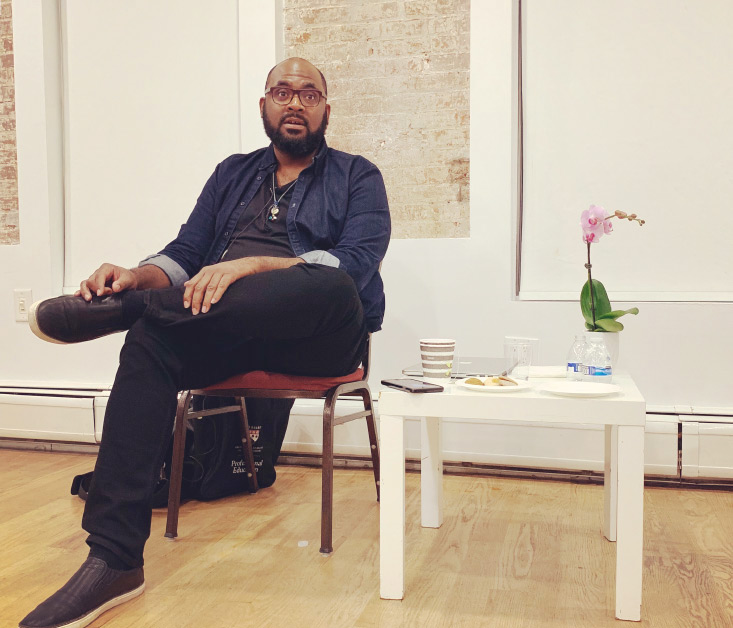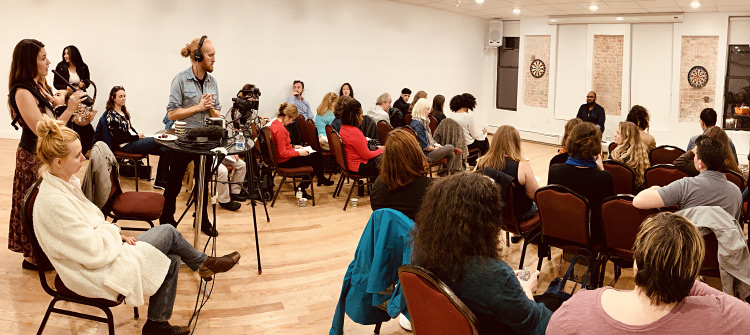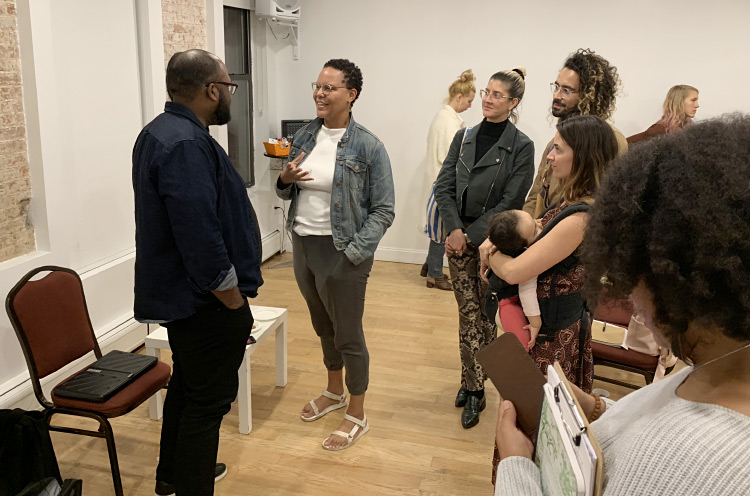by Helen Park
On an unseasonably warm November night, current students and alumni of the Contemplative Psychotherapy Program (CPP) in New York City gathered to receive teachings from Lama Rod Owens. Lama Rod is one of the most exciting and inspiring Dharma teachers of our time, having received teaching authorization by the Kagyu school of Tibetan Buddhism after completing a three-year silent retreat, and drawing upon his own very personal life experiences as a Black, queer man raised in the South. He held space with us for close to three hours, inviting us to be in contemplative presence together that was intimate, playful, ‘triggering in a positive way,’ and deeply restorative.

Lama Rod Owens teaching about skillful ways to work with compassion and anger for the Contemplative Psychotherapy Program in New York City.
We invited Lama Rod on behalf of CPP and Nalanda Institute’s Radical Compassion Project, a community-based effort to deepen the Institute’s dialogue and ways of being/thinking/doing in our engagement with race, social justice, equity, and the contemplative path. Lama Rod’s presence was grounding, healing, and unapologetically truthful, his words simple and cutting straight to the root of the misperceptions and obstacles that so often block our path toward genuine and wise compassion for ourselves and others. The evening’s topics were salient for our present sociopolitical climate in the US and resonated deeply at the heart of many questions and conflicts CPP students have brought into class discussions concerning how to follow the contemplative path, work with anger, and be an active agent in a world that seems permeated with continual collective and interpersonal suffering.
With great care and a kind of gentle procedural guidance, Lama Rod took us through a step-by-step sequence of how to cultivate genuine, wise compassion – the kind that begins with the self, then dissolves boundaries by recognizing the wisdom of emptiness, and that is also discerning and forceful enough to create boundaries that take care of self and other when harm or violence is present. This is not easy or comfortable stuff. Indeed, as Lama Rod reminded us, transformation does not happen through comfort. We grow through our discomfort. Everything on the path is meant for us to go through, and to bypass our experience or the necessary steps toward liberation, is to commit an act of violence. So, we first begin by taking on our own suffering.

CPP students and Nalanda Institute community sharing their personal experiences with the lecture with Lama Rod
I should note that Lama Rod’s visit to our program coincided quite beautifully with our current study of the root text, Geshe Chekawa Yeshe Dorje’s Transforming the Mind in Seven Points, also known to be part of the larger canon of lojong, or mind training texts in Mahayana Buddhism. In this collection of pithy one-liners packed full of wisdom, Dorje outlines the steps for training in the “emotional spirit of compassion” (Loizzo, 2009), or relative compassion, the kind that opens us to our subjective experience in this particular mind-body system and in this particular lifetime, so that we may extend love and care to others we encounter on our path.
Part of cultivating this foundational level of compassion begins with taking care of ourselves and recognizing our core wounds in order to tend to them and then be able to take responsibility for our lives. In this way we are better equipped, or resourced as Lama Rod would say, to extend compassion and care to others. To attempt to extend compassion without this step, when one is under-resourced, is dangerous and may very likely cause harm, so we have to take care in not skipping steps.
The next point in the root text then builds upon this foundation to integrate the wisdom of emptiness, or interdependence, so that we may know what to do with this feeling state of expansive compassion for others. We must go from just having a mental experience of dissolving boundaries of self and other, as Lama Rod would describe it, to actually getting off the cushion and doing something to limit the conditions of harm and increase the conditions for safety, happiness, and liberation for others.

After his teaching, Lama Rod answered questions. CPP student Ann Campbell asking Lama Rod about how to find teachers on the spiritual path.
Lama Rod’s teachings were a true blessing for our community. The evening’s talk touched upon so many other topics that I feel we all needed, and had not previously realized just how much. We explored how to honor and celebrate our anger as part of our path to healing and compassionate action; decoupling hatred from the anger response; accessing your inner resources to know when you can help and when you must refrain from relationship; and simply how to allow yourself to really feel and accept the truth of your emotions.
He offered a meditation practice called the Seven Homecomings, a way of invoking the resources that fill us: our benefactors, sacred texts, our ancestors, the earth, silence, so that we may give up the things that deplete or traumatize us, and to be safe, at ease, and ready to help, engage, and be available to our lives and for each other. He often called upon one of his own benefactors, the great American writer and activist Audre Lorde, when speaking about the importance of self-preservation while living a world that creates systems built to deplete and annihilate you. In order to do the greater work of liberation, our compassion work, our self-care, our openness to the suffering of others, our wisdom voice, and our benefactors all must be honored, ritualized, and made systematic. We do this through our practice, and by calling in the resources to heal and fill us again with joy and the blissful wisdom of emptiness.
It’s somewhere within this delicate, nuanced, and super complex dance between the relative and the ultimate, between self and other, between anger, pain, healing, and liberation. Lama Rod left us all with so many more questions that perhaps are more like openings into spaces that feel so foreign, so unknown, yet somehow were always ours to come home to.
Editor’s note: Helen Park is the Director of the Contemplative Psychotherapy Program and a Co-Director of the Radical Compassion Project. More about Lama Rod Owens may be found on his website, lamarod.com
